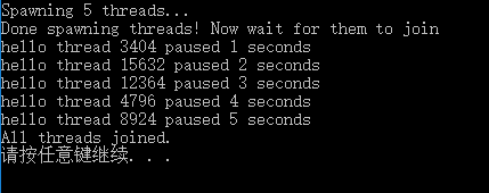Last blog< C++11 Concurrent Guide I (A Preliminary Study of C++11 Multithreading) > It just mentions the basic usage of std::thread and gives a simple example. This article will introduce the usage of std::thread in some detail.
std::thread is declared in the < thread > header file, so the # include < thread > header file is required when using std::thread.
std::thread construction
- (1). The default constructor creates an empty thread execution object.
- (2) Initialize the constructor and create a thread object, which can be joinable. The newly generated thread will call the fn function, and the parameters of the function are given by args.
- (3) The copy constructor (disabled) means that thread s cannot be copied.
- (4). The move constructor, the move constructor, does not represent any thread ed e x ecution object after a successful call.
- Note: threads that can be joinable must be joined by the main thread or set to detached before they are destroyed.
Examples of std::thread constructors link
#include <iostream>
#include <utility>
#include <thread>
#include <chrono>
#include <functional>
#include <atomic>
void f1(int n)
{
for (int i = 0; i < 5; ++i) {
std::cout << "Thread " << n << " executing\n";
std::this_thread::sleep_for(std::chrono::milliseconds(10));
}
}
void f2(int& n)
{
for (int i = 0; i < 5; ++i) {
std::cout << "Thread 2 executing\n";
++n;
std::this_thread::sleep_for(std::chrono::milliseconds(10));
}
}
int main()
{
int n = 0;
std::thread t1; // t1 is not a thread
std::thread t2(f1, n + 1); // pass by value
std::thread t3(f2, std::ref(n)); // pass by reference
std::thread t4(std::move(t3)); // t4 is now running f2(). t3 is no longer a thread
t2.join();
t4.join();
std::cout << "Final value of n is " << n << '\n';
}move assignment operation
- (1) The motion assignment operation, if the current object is not joinable, needs to pass a right-value reference (rhs) to the motion assignment operation; if the current object can be joinable, terminate() will report an error.
- (2) Copy assignment is disabled and thread s cannot be copied.
See the following examples:
#include <stdio.h>
#include <stdlib.h>
#include <chrono> // std::chrono::seconds
#include <iostream> // std::cout
#include <thread> // std::thread, std::this_thread::sleep_for
void thread_task(int n) {
std::this_thread::sleep_for(std::chrono::seconds(n));
std::cout << "hello thread "
<< std::this_thread::get_id()
<< " paused " << n << " seconds" << std::endl;
}
/*
* === FUNCTION =========================================================
* Name: main
* Description: program entry routine.
* ========================================================================
*/
int main(int argc, const char *argv[])
{
std::thread threads[5];
std::cout << "Spawning 5 threads...\n";
for (int i = 0; i < 5; i++) {
threads[i] = std::thread(thread_task, i + 1);
}
std::cout << "Done spawning threads! Now wait for them to join\n";
for (auto& t: threads) {
t.join();
}
std::cout << "All threads joined.\n";
return EXIT_SUCCESS;
}Other member functions
- get_id Get the thread ID.
- joinable Check whether threads can be join ed.
- join Join thread.
- detach Detach threads
- swap Swap threads.
- native_handle Return native handle.
- hardware_concurrency [static] Detect hardware concurrency features.
